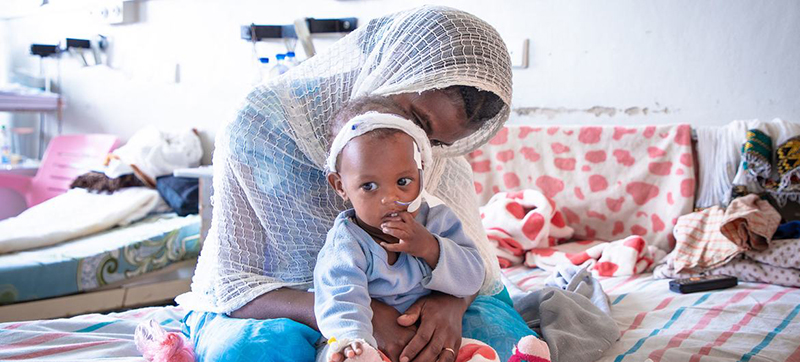 Ethiopia
Ethiopia UN food agency ramps up deliveries amid worsening food security in Ethiopia
As severe hunger ripples across northern Ethiopia, the World Food Programme (WFP) is ramping up efforts to deliver lifesaving assistance to three million people in the coming weeks to avert “a major humanitarian catastrophe”, the agency announced on Tuesday.
“WFP, with our partners, are working tirelessly to reach millions of Ethiopians at risk of hunger in the first quarter of the year to help keep a major humanitarian catastrophe at bay," said Chris Nikoi, the agency’s interim Country Director in Ethiopia.
“WFP is extremely concerned about the deteriorating food security in northern Ethiopia, where many are already facing severe hunger,” he stressed.
Activating more robust delivery mechanisms to its operations in Ethiopia since late 2023, the agency is working to ensure the delivery of critical food assistance to the hungriest populations affected by drought, flooding and conflict.
The food agency’s refugee operations are also crucial, the agency reported. As the conflict in Sudan that began in April 2023 continues to drive flows of refugees, an additional 200,000 Sudanese refugees are expected to arrive in Ethiopia, putting a strain on WFP’s refugee assistance if no additional funding is received.
Rising hunger
WFP has so far digitally registered almost 6.2 million of the most vulnerable people in Afar, Amhara, Tigray and Somali regions, WFP’s Mr. Nikoi said.
Late last week, the agency and the Ethiopian Government issued a joint appeal for urgent funding to respond to rising hunger in the north.
To date, more than six million people are already receiving food and cash across affected areas, but large gaps remain, OCHA warned on Friday.
Since resuming food distribution in early December, WFP has made deliveries to 1.2 million people in those regions, with a view to reaching three million people in the coming weeks, of which almost two million are in Tigray.
However, the agency urgently needs $142 million to replenish its limited food stocks in the country so it can keep reaching and delivering assistance to the most vulnerable people until June 2024 and to respond to the drought at scale.
“If WFP doesn’t receive additional funding, we will have to cease food distributions to refugees in April,” Mr. Nikoi said.
Partnering to feed millions and build resilience
The Government of Ethiopia’s most recent assessment of food security needs projected that 15.8 million people will face hunger and need food assistance in 2024, including more than four million internally displaced people and 7.2 million who have high levels of acute food insecurity and need emergency assistance.
The overall goal is to provide food assistance to 40 per cent of the 7.2 million, if resources are available, while the government and other partners will support the rest, WFP stated.
A key element of the agency’s response is transitioning from humanitarian relief to resilience programmes.
To that end, WFP aims to reach 1.4 million people in 2024 with activities that strengthen livelihoods and food systems in Ethiopia, including schemes to harvest water, irrigate land and improve access to markets as well as providing training on agricultural best practices and post-harvest loss technologies.
Support Our Journalism
We cannot do without you.. your contribution supports unbiased journalism
IBNS is not driven by any ism- not wokeism, not racism, not skewed secularism, not hyper right-wing or left liberal ideals, nor by any hardline religious beliefs or hyper nationalism. We want to serve you good old objective news, as they are. We do not judge or preach. We let people decide for themselves. We only try to present factual and well-sourced news.







